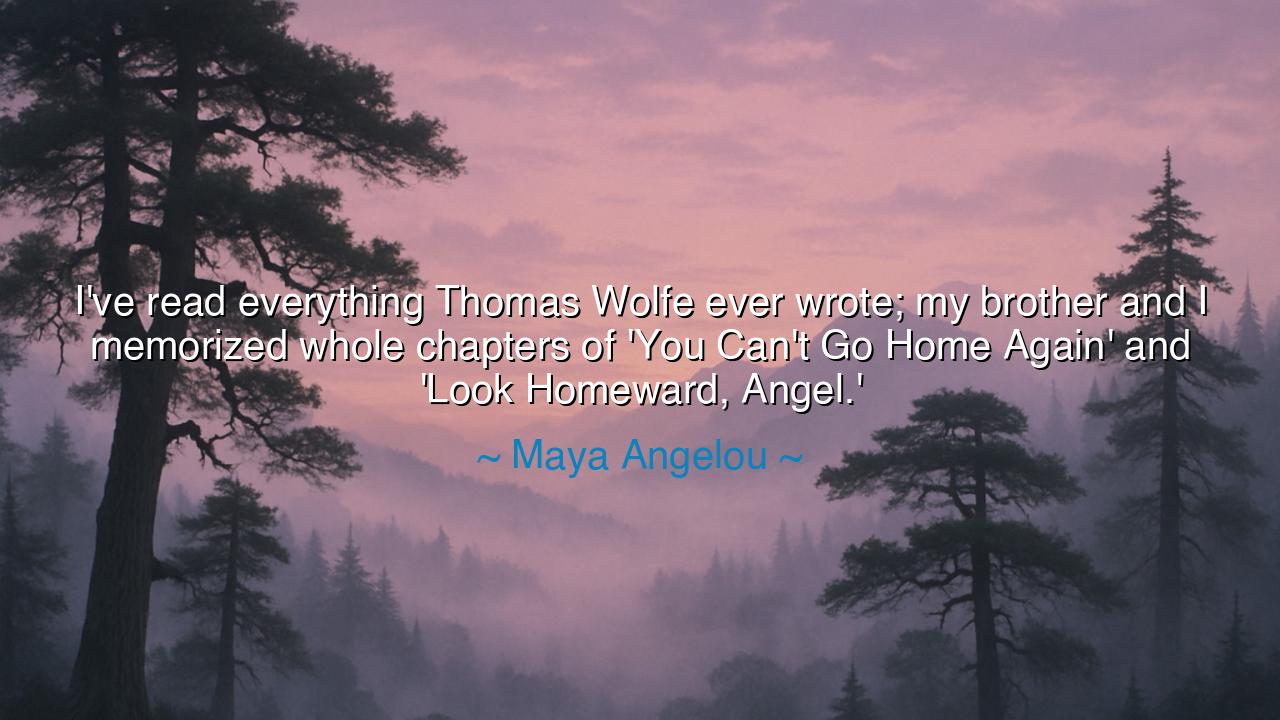
I've read everything Thomas Wolfe ever wrote; my brother and I
I've read everything Thomas Wolfe ever wrote; my brother and I memorized whole chapters of 'You Can't Go Home Again' and 'Look Homeward, Angel.'






The words of Maya Angelou—“I’ve read everything Thomas Wolfe ever wrote; my brother and I memorized whole chapters of You Can’t Go Home Again and Look Homeward, Angel”—are not merely an admission of admiration, but a declaration of kinship between kindred spirits of the written word. Beneath these lines lies the sacred bond that unites one artist to another across the vast distances of time and circumstance. For in Thomas Wolfe, Angelou found a mirror for her own soul—a writer who sought to capture the ache of existence, the longing for belonging, and the eternal struggle between the self and the world. Her devotion to his work reveals a truth the ancients knew well: that the study of greatness does not diminish the seeker—it refines them.
To “memorize whole chapters” is not merely to read, but to let another’s voice become part of one’s own. This is no idle pastime; it is a sacred apprenticeship. The ancient poets called this mimesis, the art of learning by imitation—not to copy, but to absorb, to allow the flame of another’s genius to ignite one’s own. In reciting Wolfe’s words, Angelou was not merely recalling sentences; she was breathing life into his spirit, letting his rhythms shape her own music. It is through this communion that the apprentice becomes the master, and the reader becomes the writer. As the ancients said, “We drink from the wells dug by those who came before us.”
Thomas Wolfe’s “Look Homeward, Angel” and “You Can’t Go Home Again” are works suffused with nostalgia, yearning, and the search for identity. They speak of the exile of the soul—the truth that once one has grown and changed, one can never return unchanged to the innocence of the past. For Angelou, whose own life was marked by dislocation, transformation, and renewal, these themes resonated deeply. Like Wolfe, she understood the restlessness of the human spirit, that longing to return to a place or a time that no longer exists. Her own journey—from the segregated South to the world stage—was one of constant evolution. To memorize Wolfe’s prose was to affirm that her struggle and his were bound by the same eternal human quest: to find home within oneself.
The ancients might have compared this act of devotion to that of students in the Academy of Plato, who memorized the words of their teacher not as a duty, but as a means of transformation. They knew that to repeat wisdom is to let it echo within the chambers of one’s soul, reshaping thought and deepening understanding. So too did Maya and her brother recite the words of Wolfe, not as worshipers before an idol, but as seekers before a flame. In doing so, they participated in a lineage as old as civilization itself: the passing down of wisdom through words, the blending of voices across time, until the distinction between teacher and student dissolves.
Angelou’s reverence for Wolfe also reminds us that art is not bound by race, nation, or era. Though he was a white man of the early twentieth century and she a Black woman who rose to prominence amid the civil rights movement, their souls met in the realm of the universal. Both wrote of the longing for meaning, of the tension between belonging and individuality. Their connection shows that great literature transcends division—it speaks to the essence of being human. It teaches that truth, once uttered, belongs to all who can feel its resonance. The heart does not ask the color of the voice that moves it; it simply knows when it has heard itself echoed.
There is also a deeper humility in Angelou’s words. To confess to loving another’s work so completely is to recognize that even the greatest minds are lifelong students. She, who became one of the most celebrated poets and voices of her generation, still knelt before the altar of another’s art. The ancients would call this sophrosyne—the virtue of knowing that wisdom is endless, that no soul, however accomplished, is beyond learning. In her devotion to Wolfe, Angelou teaches us that true mastery requires reverence; the artist must remain ever open, ever curious, ever willing to be moved.
And so, the lesson for all who seek to grow—whether as writers, thinkers, or human beings—is this: immerse yourself in the greatness that came before you. Read deeply. Memorize what moves you. Let the words of others shape your understanding of the world. For wisdom is not born in isolation; it is inherited, carried, and renewed through generations of hearts that listen. As Maya Angelou once learned from Thomas Wolfe, we too may learn that art is a bridge—spanning time, sorrow, and distance—uniting us in our shared longing to know who we are, and where, in this vast world, we truly belong.
So remember this, my friends: to learn from another’s words is not to lose yourself, but to find yourself more deeply. Let the great voices of the past speak through you, as Wolfe spoke through Angelou. For when the wisdom of one generation takes root in the next, the spirit of humanity continues its eternal song—ever changing, yet ever the same.






AAdministratorAdministrator
Welcome, honored guests. Please leave a comment, we will respond soon